300+ Bài tập về các thì trong tiếng Anh (có đáp án)
Thì hiện tại đơn
1. Tóm tắt kiến thức
Thì hiện tại đơn (Present simple): Diễn tả một sự việc hay một hành động mang tính chất chung chung, tổng quan hay được lặp đi lặp lại nhiều lần, thường được diễn tả một sự thật hiển nhiên hoặc một hành động diễn ra trong thời điểm hiện tại.
Cấu trúc:
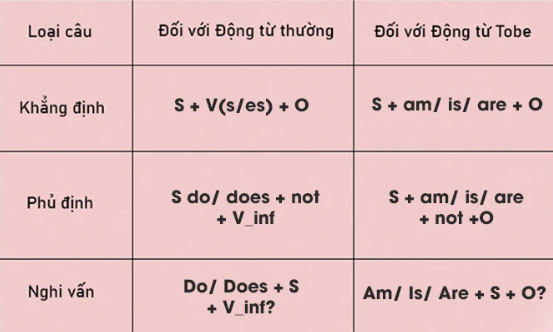
Ví dụ của động từ tobe:
- I am an engineer. (Tôi là một kỹ sư.)
- The car isn’t expensive. (Chiếc ô tô này không đắt tiền.)
- Are they students? (Họ là sinh viên à?)
Ví dụ của động từ thường:
- The Sun sets in the West. (Mặt trời lặn ở hướng Tây.)
- She doesn’t do exercise every evening. (Cô ấy không tập thể dục mỗi tối.)
- Do they often go to school on foot? (Họ có thường đi bộ đến trường không?)
Cách dùng:
- Diễn tả một chân lý, sự thật hiển nhiên trong cuộc .
- Diễn tả một thói quen, hành động mang tính chất lặp đi lặp lại.
- Diễn tả một kế hoạch (lịch học, lịch đi lại bằng tàu, máy bay…) có giờ giấc cụ thể, được sắp xếp cho tương lai.
Sơ đồ tư duy:
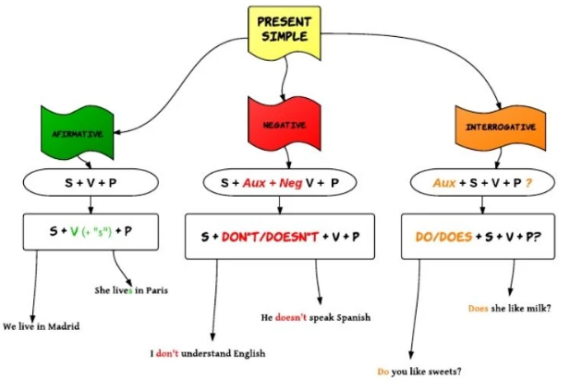
2. Bài tập về Thì hiện tại đơn
Bài tập 1. Chia dạng đúng của các từ trong ngoặc ở thì hiện tại đơn
1. She often ______delicious meals. (make)
2. Hana ______eggs. (not eat)
3. They______(do) the homework on Monday.
4. He ______ (meet) friends every Sunday. (meet)
5. My sister ______ shopping every week. (go)
6. ______Nam and Hoa ______ to work by bus every day? (go)
7. _____ her parents ______with her decision? (agree)
8. Hoa ______ her hair every day. (wash)
9. The police ______ robbers. (catch)
Đáp án
1. makes
2. does not eat/ doesn't eat
3. do
4. meets
5. goes
6. Do Nam and Hoa go...
7. Does her parents agree...
8. washes
9. catch
Bài tập 2. Tìm và sửa lỗi sai thì hiện tại đơn
1. He doesn’t plays chess in the afternoon.
2. The bus don’t arrive at 10 a.m.
3. Our parents doesn’t live in a luxury house.
4. They aren’t do their job on weekends.
5. The dog don’t like me.
Đáp án
1. plays → play
2. don’t → doesn’t
3. doesn’t → don’t
4. aren’t → don’t
5. don’t → doesn’t
Thì hiện tại tiếp diễn
1. Tóm tắt kiến thức
Thì hiện tại tiếp diễn (Present continuous tense): Diễn tả một hành động xảy ra vào thời điểm hiện tại, đang diễn ra và kéo dài dài một thời gian ở hiện tại.
Cấu trúc:
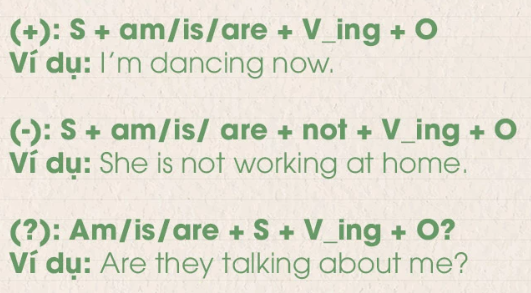
Cách dùng:
- Diễn tả một hành động đang diễn ra ngay thời điểm hiện tại.
- Sau câu mệnh lệnh, đề nghị.
- Kết hợp với trạng từ Always thể hiện sự than phiền, khó chịu khi một hành động nào đó xảy ra lặp đi lặp lại.
- Diễn tả một hành động/ sự việc sắp xảy ra trong tương lai gần.
Sơ đồ tư duy:
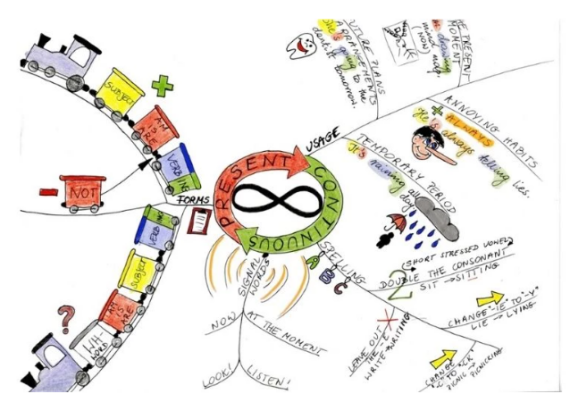
2. Bài tập Thì hiện tại tiếp diễn
Bài tập 1: Hoàn thành các câu sau sử dụng thì hiện tại tiếp diễn
1. Her/ dad / water/ some trees/ the/ garden
________________________
2. My/ younger sister/ clean/ floor/
________________________
3. Tiana/ have/ lunch/ her/ friends/ a/ restaurant
________________________
4. They/ ask/ a/ woman/ about/ the/ way/ the/ railway/ station
________________________
5. My/ friend/ draw/ a/ beautiful/ picture
________________________
Đáp án
1. My dad is watering some trees in the garden.
2. My younger sister is cleaning the floor.
3. Tiana is having lunch with her friends at a restaurant.
4. They are asking a woman about the way to the railway station.
5. My friend is drawing a beautiful picture.
Bài tập 2: Chia dạng đúng cho các động từ trong ngoặc ở thì hiện tại tiếp diễn 1. Look! The car (move) so fast.
1. Listen! Someone (whisper) in the next room.
2. Your friend (sit) next to the beautiful girl over there at present?
3. Now Joy (try) to pass the examination.
4. It’s 11 o’clock, and my mom (cook) lunch in the kitchen.
5. Keep silent! You (sing) so loudly.
6. I (not stay) at home at the present.
7. Now Hana (lie) to her mother about her bad marks.
8. At present they (travel) to LA.
9. Jim (not work) in his office now.
Đáp án
1. is moving
2. is whispering
3. is sitting
4. are trying
5. is cooking
6. is singing
7. am not staying
8. is lying
9. are traveling
10. is not working
Thì hiện tại hoàn thành
1. Tóm tắt kiến thức
Thì hiện tại hoàn thành (Present perfect tense): Diễn tả về một hành động đã được hoàn thành cho tới thời điểm hiện tại mà không bàn luận về thời gian diễn ra hành động đó.
Cấu trúc:
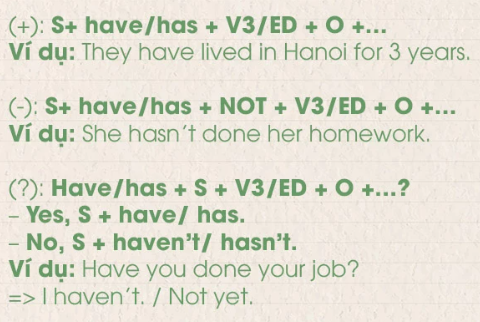
Cách dùng:
- Diễn tả một hành động xảy ra và kết thúc trong quá khứ không xác định rõ thời gian.
- Diễn tả một hành động vừa mới xảy ra (thường đi với “just” hoặc “recently”).
- Diễn tả một hành động/ sự việc nào đó bắt đầu từ quá khứ, vẫn kéo dài tiếp đến hiện tại và có thể duy trì trong tương lai.
- Thường thấy trong cấu trúc so sánh nhất.
Sơ đồ tư duy:
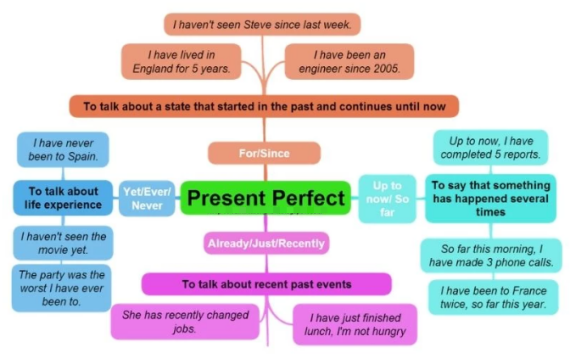
2. Bài tập Thì hiện tại hoàn thành
Bài tập 1: Chia các động từ trong ngoặc sang thì hiện tại hoàn thành
1. There is no more ice cream. I (eat)……………. it all, I’m afraid.
2. The report isn’t right. They (make)………….. a mistake.
3. Don’t you want to see this horror movie? It ………….(start).
4. It’ll soon get warm here. I (turn)……….. the heating on.
5. ……… Linda (pay)…….. money for your mother?
6. Someone (take)………………. my car.
7. Wait a minute, please! I (finish)……………. my lunch.
8. ……… you ever (eat)………….. durian?
9. Kitty (not/come)…………… here for a very long time.
10. I (work)………….. at KD company for three years.
Đáp án:
1. have eaten
2. have made
3. has started
4. have turned
5. Has Linda paid
6. has taken
7. have finished
8. Have you eaten
9. hasn't come
10. have worked
Bài tập 2: Viết lại câu không thay đổi nghĩa (thì hiện tại hoàn thành)
1) This is the first time Tim went abroad.
=> Tim hasn’t ________________________________________
2) Anna started driving 1 month ago.
=> Anna has _________________________________________
3) They began drinking beer when it started to rain.
=> They have ________________________________________
4) She last had my hair cut when she left him.
=> She hasn't __________________________________________
5) The last time Sana kissed me was 3 months ago.
=> Sana hasn't _______________________________________
Đáp án:
1. Tim hasn’t never gone abroad before.
2. Anna has driven for 1 month.
3. They have drunk beer since it started raining.
4. She hasn't cut her hair since she left him.
5. Sana hasn’t kissed me for 3 months.
Thì hiện tại hoàn thành tiếp diễn
1. Tóm tắt kiến thức
Thì hiện tại hoàn thành tiếp diễn (Present perfect continuous tense): Diễn tả một hành động hoặc sự kiện đã bắt đầu trong quá khứ và vẫn tiếp diễn ở hiện tại, có khả năng dẫn đến tương lai bì vậy không có kết quả rõ ràng. Thì hiện tại hoàn thành tiếp diễn – một trong 12 thì tiếng Anh được sử dụng nhằm nhấn mạnh khoảng thời gian của một hành động đã bắt đầu trong quá khứ và tiếp tục đến hiện tại (có thể trong tương lai).
Cấu trúc:
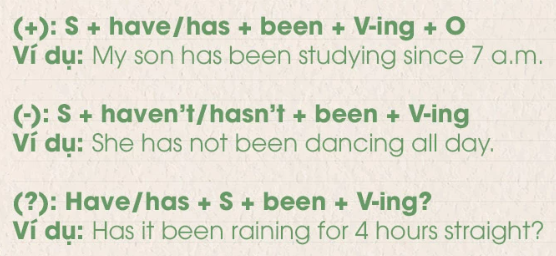
Cách dùng
- Dùng để nhấn mạnh tính liên tục của một hành động hoặc sự việc (bắt đầu từ quá khứ, tiếp diễn tới hiện tại và có khả năng kéo dài đến trong tương lai).
- Diễn tả một hành động vừa mới kết thúc nhưng có ảnh hưởng, để lại hậu quả ở hiện tại.
2. Bài tập Thì hiện tại hoàn thành tiếp diễn
Bài tập 1: Chia động từ trong ngoặc sang thì hiện tại hoàn thành tiếp diễn
1. My best friend _______French since September. (learn)
2. I’m getting tired. I _______ for the car for hours. (wait)
3. Sara ______ about where to go this weekend. (think)
4. Mary looks very exhausted because she ______ all night. (work)
5. Hoa ______ this book since last night. (read)
Đáp án:
1. has been learning
2. have been waiting
3. has been thinking
4. has been working
5. has been reading
Bài tập 2: Hoàn thành câu với thì hiện tại hoàn thành tiếp diễn và “ever since”
Ví dụ: Jin finished his business degree. Then he started to work for an international technology company.
=> Jin has been working for an international technology company ever since he finished his business degree.
1. Pony got a very bad flu. After that, she began to take vitamins.
=> Pony has ______________________________________________
2. David’s car broke down. Then he began to walk to work.
=> David has ______________________________________________
3. Jen’s doctor told her to lose weight. Then she began to do exercise.
=> Jen has ________________________________________________
4. Lim’s parents received the bad news. Then they started to cry.
=> Lim’s parents have _______________________________________
5. John’s wife died of cancer. Then he started to volunteer at the hospital.
=> John has _______________________________________________
Đáp án
1. Pony has been taking vitamins ever since she got the very bad flu.
2. David has been walking to work ever since his car broke down.
3. Jen has been doing exercise ever since her doctor told her to lose weight.
4. Lim’s parents have been crying ever since they received the bad news.
5. John has been volunteering at the hospital ever since his wife died of cancer.
Thì quá khứ đơn
1. Tóm tắt kiến thức
Thì quá khứ đơn (Past simple tense): Diễn tả một hành động đã được xảy ra trong quá khứ (không còn diễn ra hoặc gây ảnh hưởng tới hiện tại), đã chấm dứt ở hiện tại và biết rõ thời gian hành động đó đã diễn ra.
Cấu trúc:
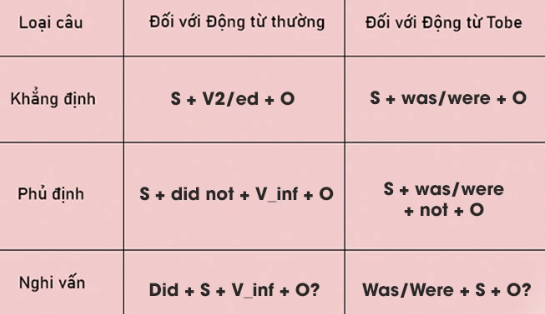
Ví dụ động từ tobe:
- I was at my aunt's house yesterday afternoon. (Tôi đã ở nhà dì tôi chiều hôm qua)
- He wasn’t at home last Sunday. (Anh ấy đã không ở nhà Chủ Nhật tuần trước.)
- Were they your friends? (Họ đã là bạn của cậu à?)
Ví dụ của động từ thường:
- We visited Singapore last summer. (Chúng tôi du lịch Singapore mùa hè trước.)
- She didn’t show me how to open the oven. (Cô ấy không cho tôi thấy cách mở lò nướng.)
- Did they help you? (Họ đã giúp bạn à?)
Cách dùng:
- Diễn tả một hành động/ sự việc đã xảy ra và kết thúc ngay tại một thời điểm xác định trong quá khứ.
- Diễn tả một thói quen trong quá khứ, nhưng hiện tại không còn nữa.
- Kể lại các hành động ngắn, xảy ra liên tiếp nhau trong quá khứ.
- Sử dụng trong câu điều kiện loại 2.
Sơ đồ tư duy:
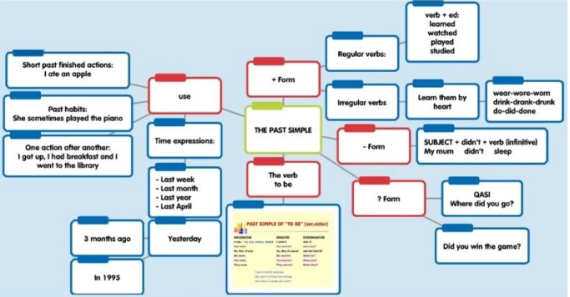
2. Bài tập Thì quá khứ đơn
Bài tập 1: Chia động từ trong ngoặc ở thì quá khứ đơn
1. Lily (eat)___________ dinner at five o’clock yesterday.
2. My dad (buy)___________ a new car last month.
3. They (go)___________ to LA on their last summer holiday.
4. My family and I (see)___________ a horror movie last night.
5. First, Minh and Lan (do)___________ homework, and then they (drink)___________ some juice.
6. Suddenly, the cat jumped and (bite)___________ my hand.
7. What time (do)___________ they (get up)___________ this afternoon?
8. I think I (hear)___________ a strange sound outside the house 5 minutes ago.
9. When I was 5 years old, I (break)__________ my arm. It really (hurt) __________.
10. The police (catch)___________ all three of the robbers last month.
11. How many times (do)___________ you (read)___________ this book?
Đáp án:
1. ate
2. bought
3. went
4. saw
5. did - drank
6. bit
7. did they get up
8. heard
9. broke - hurt
10. caught
11. did you read
Bài tập 2: Hoàn thành câu sau ở thì quá khứ đơn
1. It/ be/ sunny/ yesterday.
2. In 1991/ we/ move/ to another city.
3. When/ they/ get/ the first award?
4. She/ not/ go/ to the church/ 3 days ago.
5. How/ be/ Jimin/ yesterday?
6. They/ happy/ last holiday?
7. How/ you/ get there?
8. I/ play/ soccer/ last/ Sunday.
9. My/ friend/ make/ two/ cake/ two/ day/ ago.
10. She/ tell/ me/ her secret/ last night.
Đáp án:
1. It was sunny yesterday.
2. In 1991, we moved to another city.
3. When did they get the first award?
4. She did not go to the church 3 days ago.
5. How was Jimin yesterday?
6. Were they happy last holiday?
7. How did you get there?
8. I played soccer last Sunday.
9. My friend made two cakes two days ago.
10. She told me about her secret last night.
Thì quá khứ tiếp diễn
1. Tóm tắt kiến thức
Thì quá khứ tiếp diễn (Past continuous tense): Nhấn mạnh quá trình hay sự phát triển của sự vật hay sự việc hay thời gian sự vật, sự kiện đã diễn ra.
Cấu trúc:
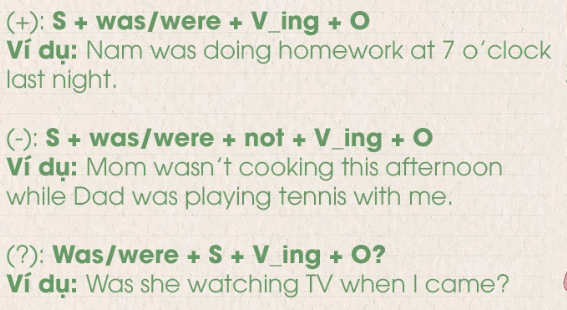
Cách dùng:
- Nói đến một hành động/ sự việc đang diễn ra tại một thời điểm xác định trong quá khứ.
- Diễn tả một hành động đang xảy ra trong quá khứ thì xuất hiện một hành động khác xen ngang (hành động xen vào thường được chia ở quá khứ đơn).
- Diễn tả các hành động xảy ra song song cùng lúc
2. Bài tập Thì quá khứ tiếp diễn
Bài tập 1: Chia động từ trong ngoặc ở thì quá khứ tiếp diễn
1. Lisa______ (swim) in the sea when the rain started.
2. Some people _______ (relax) by the pool and others ______ (play) tennis.
3. For the first two days of my holiday I ______ (stay) with my family.
4. While I was driving home, Jack _____ (try) desperately to contact me.
5. My sister ______ (watch) TV when he got home.
Đáp án
1. was swimming
2. were relaxing - were playing
3. was staying
4. was trying
5. was watching
Bài tập 2: Tự hoàn thành vế còn lại của các câu sau bằng thì quá khứ tiếp diễn
1. At 8 o’clock last night, I _____________________________________
2. At 5 o’clock last Monday, _____________________________________
3. At 10:15 yesterday morning, __________________________________
4. At 7:45 last night, ___________________________________________
5. Half an hour ago, ___________________________________________
6. Suzy phoned us while we _____________________________________
Đáp án:
1. At 8 o’clock last night, I was watching a comedy film.
2. At 5 o’clock last Monday, my mom was watering plants in the garden.
3. At 10:15 yesterday morning, my parents were cooking a meal.
4. At 7:45 last night, I was reading an interesting book.
5. Suzy phoned us while we were doing exercise.
Thì quá khứ hoàn thành
1. Tóm tắt kiến thức
Thì quá khứ hoàn thành (Past perfect tense): Mô tả một hành động xảy ra trước một hành động khác trong quá khứ. Hành động nào xảy ra trước sẽ được sử dụng thì quá khứ hoàn thành. Hành động nào xảy ra tiếp theo sẽ dùng thì quá khứ đơn.
Cấu trúc:
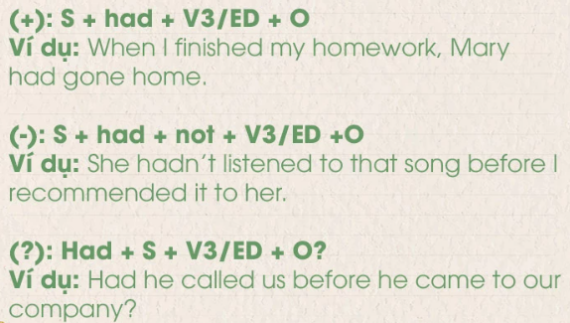
Cách dùng
2. Bài tập Thì quá khứ hoàn thành
Bài tập 1: Chia động từ trong ngoặc ở thì quá khứ hoàn thành
1. When I arrived Kathy ______(go) away.
2. If I ______(know) the truth, I wouldn’t have behaved like that.
3. By the time I met you, I ______(work) in that company for five years.
4. Sunny ______(study) in Korea before she did her masters at Harvard.
5. _____ the film ______(end) when he arrived at the cinema?
Đáp án:
1. had gone
2. had known
3. had worked
4. had studied
5. Had the film ended
Bài tập 2: Viết lại câu dựa vào từ cho sẵn
1. Kai had gone home before we arrived.
=> After _________________________________________________________
2. We closed the door, then we took a look around the shops.
=> Before ________________________________________________________
3. The light had gone out before they got out of the station.
=> When _________________________________________________________
4. After Lam had explained everything clearly, we started our work.
=> By the time _____________________________________________________
5. My sister had watered flowers in the garden by the time my mother came home.
=> Before _________________________________________________________
Đáp án:
1. After Kai had gone home, we arrived.
2. Before we took a look around the shops, we had closed the door.
3. When they got out of the station, the light had gone out.
4. By the time we started our work, Lam had explained everything clearly.
5. Before my mother came home, my sister had watered flowers in the garden.
Thì quá khứ hoàn thành tiếp diễn
1. Tóm tắt kiến thức
Thì quá khứ hoàn thành tiếp diễn (Past perfect continuous tense): Diễn đạt quá trình thực hiện một hành động bắt đầu trước khi một hành động khác xảy ra trong quá khứ. Thì này thường chỉ dùng khi nào cần thể hiện tính chính xác của hành động.
Cấu trúc:
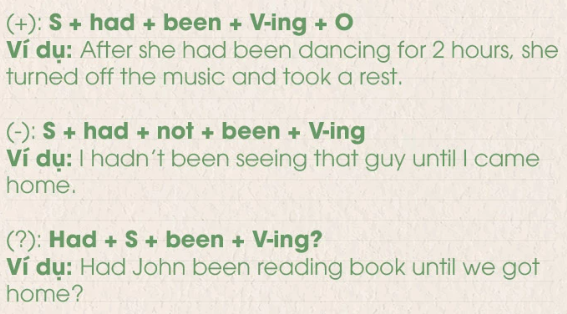
Cách dùng:
- Dùng để diễn tả một hành động đã xảy ra suốt một khoảng thời gian (gần như liên tục) trước khi một hành động khác xảy ra trong quá khứ.
- Diễn tả một hành động kéo dài liên tục trước một mốc thời gian ở quá khứ.
- Diễn tả một hành động kéo dài liên tục trước đó và dù đã kết thúc nhưng vẫn để lại ảnh hưởng, hậu quả tại một thời điểm nhất định trong quá khứ.
2. Bài tập Thì quá khứ hoàn thành tiếp diễn
Bài tập 1: Chi động từ trong ngoặc ở thì quá khứ hoàn thành tiếp diễn
1. Yesterday, my dad said he ______ (stop) smoking for 2 months.
2. The photographers ______(wait) hours for the stars to arrive at the 2023 Oscar ceremony.
3. We ______ (talk) on the phone when the rain poured down.
4. I felt ill because I ________________________ (drink) five cups of coffee.
5. She ______________________ (study) all day, so she was tired.
Đáp án:
1. had been stopping
2. had been waiting
3. had been talking
4. had been drinking
5. had been studying
Bài tập 2: Chọn đáp án đúng cho câu
1. Emily loves this writer’s books. She (has been reading / had been reading) them for years.
2. Her clothes were dirty because she (has been working / had been working) in the garden.
3. Where have you been? We (had been waiting / have been waiting) for his comeback for ages.
4. Jimmy hasn’t decided on a career yet, but he (has been thinking / had been thinking) about it lately.
5. After Sam (has been playing / had been playing) the violin for 5 years, she joined an orchestra.
Đáp án:
1. has been reading
2. had been working
3. have been waiting
4. has been thinking
5. had been playing
Thì tương lai đơn
1. Tóm tắt kiến thức
Thì tương lai đơn (Simple future tense): Mô tả một hành động xảy ra trước một hành động khác trong quá khứ. Hành động nào xảy ra trước sẽ được sử dụng thì quá khứ hoàn thành. Hành động nào xảy ra tiếp theo sẽ dùng thì quá khứ đơn.
Cấu trúc:
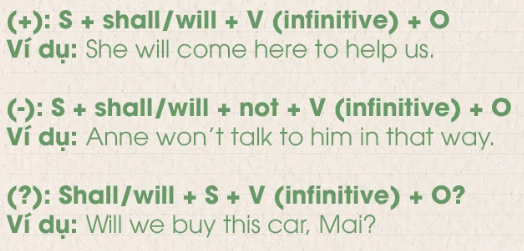
Cách dùng
- Diễn tả một dự đoán mang tính chủ quan, không dựa vào căn cứ.
- Diễn tả một quyết định ngay tại thời điểm nói, một lời hứa, sự ngỏ ý…
- Xuất hiện trong câu điều kiện loại 1.
2. Bài tập Thì tương lai đơn
Bài tập 1: Chia động từ trong ngoặc ở thì tương lai đơn
1. I _____(help) her take care of her children tomorrow.
2. _____ you_____ (come) to work tomorrow?
3. _____ you_____ please (bring) me a cup of milk?
4. If it stops raining soon, we ______(go) to the church.
5. ____ we_____(start) again from the beginning?
Đáp án
1. will help
2. Will you come
3. Will you bring
4. will go
5. Will we start
Bài tập 2: Sắp xếp lại vị trí của từ để tạo thành các câu có nghĩa
1. pretty/ caterpillar/ turn/ soon/ butterfly/ the/ a/ turn/ Will?
2. will/ Hong Kong/ they/ where/ stay/ when/ visit/ they/?
3. won’t/ out/ rains/ My mom/ not/ go/ if/ it
4. Helen/ that/ She/ come/ tonight/ hopes/ will/ to/ the/ party.
Đáp án:
1. Will the caterpillar turn into a pretty butterfly soon?
2. Where will they stay when they visit Hong Kong?
3. My mom won’t go out if it rains.
4. She hopes that Helen will come to the party tonight.
Thì tương lai tiếp diễn
1. Tóm tắt kiến thức
Thì tương lai tiếp diễn (Future continuous tense): Diễn đạt quá trình thực hiện một hành động bắt đầu trước khi một hành động khác xảy ra trong quá khứ. Thì này thường chỉ dùng khi nào cần thể hiện tính chính xác của hành động.
Cấu trúc:
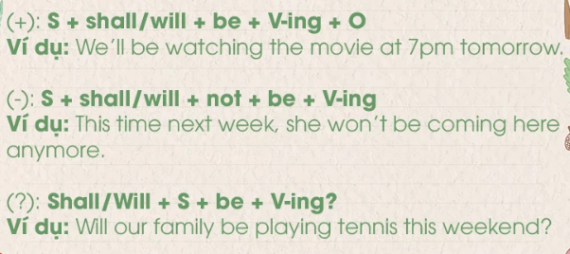
Cách dùng
-
Diễn tả hành động đang diễn ra tại một thời điểm xác định trong tương lai hoặc sẽ diễn ra và kéo dài trong suốt một khoảng thời gian ở tương lai.
-
Diễn tả một kế hoạch/ dự tính trong tương lai, với khả năng rất cao sẽ xảy ra và thường gắn với một mốc thời gian trong tương lai.
2. Bài tập Thì tương lai tiếp diễn
Bài tập 1: Chia động từ trong ngoặc ở thì tương lai tiếp diễn
1. Tomorrow afternoon, Jennie _____(build) a new website.
2. This time next month, most people _____(use) the Internet for entertainment.
3. We _____(climb) the mountain at this time next Sunday.
4. They _____(not study) at 10 a.m tomorrow.
5. _____ she ______(do) the housework at 9 p.m tomorrow?
Đáp án:
1. will be building
2. will be using
3. will be climbing
4. won’t be studying
5. Will she be doing
Bài tập 2: Viết lại thành câu có nghĩa (có chia động từ)
1. We/ be/ play/ soccer/ time/ tomorrow/ our friends.
2. Halan/ be/ study/ abroad/ time/ she/ graduate/ next year.
3. The children/ be/ live/ Ho Chi Minh city/ for/ 3 weeks.
4. Lam/ be/ do/ homework/ 8 a.m/ tomorrow morning/ so/ his sister/ not/ ask/ him/ go out.
5. They/ not/ be/ have/ lunch/ together/ when/ you/ come/ tomorrow.
Đáp án:
1. We will be playing soccer at that time tomorrow with our friends.
2. Halan will be studying abroad by the time she graduates next year.
3. The children will be living in Ho Chi Minh city for 3 weeks.
4. Lam will be doing his homework at 8 a.m tomorrow morning, so his sister won't ask him to go out.
5. They won’t be having lunch together when you come tomorrow.
Thì tương lai hoàn thành
1. Tóm tắt kiến thức
Thì tương lai hoàn thành (Future perfect tense): Diễn tả một hành động không được lên kế hoạch trước. Những hành động này thường được quyết định ngay tại thời điểm người nói đang nói.
Cấu trúc:
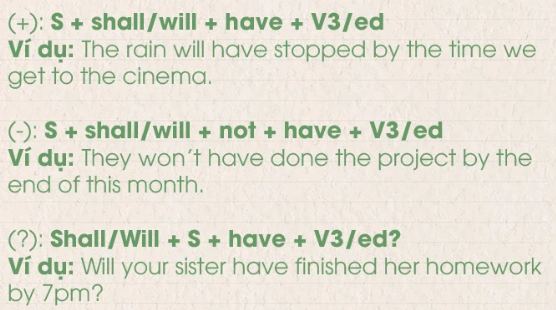
Cách dùng
Dùng để diễn tả một hành động đã xảy ra và hoàn tất trước một thời điểm hay một hành động khác ở trong tương lai.
2. Bài tập Thì tương lai hoàn thành
Bài tập 1: Chia động từ trong ngoặc ở thì tương lai hoàn thành
1. Susan_______ (finish) her homework before 9 o’clock this evening.
2. I _______ (spend) over 500,000 VND on online shopping by the end of the week.
3. I _______ (do) the job before the boss comes tomorrow.
4. By December all the leaves ________. (fall)
5. Be quick! The man _______ before you rescue it. (drown)
6. If Hana doesn’t hurry, they _________ before she comes. (leave)
7. We ___________ the washing by 9 o’clock. (do)
Đáp án:
1. will have finished
2. will have spent
3. will have done
4. will have fallen
5. will have drowned
6. will have left
7. will have done
Bài tập 2: Chọn đáp án đúng trong mỗi câu sau
1. I will let you in. I ________ with the food by the time you come in.
A. will have arrived
B. will be arrival
C. will be arrived
2. By the time they get there, the pet store ________ (close).
A. will close
B. will have closed
C. closed
3. I ________ (see) you tomorrow at 4:00 PM.
A. will see
B. see
C. will be seeing
4. The manager ________ by the time the orders come in.
A. will leave
B. will be left
C. will have left
5. If Kai continues drinking so fast, he ________ (drink) the whole bottle by midnight.
A. will drink
B. will have drunk
C. will be drinking
Đáp án:
1. will have arrived
2. will have closed
3. will see
4. will have left
5. will have drunk
Thì tương lai hoàn thành tiếp diễn
1. Tóm tắt kiến thức
Thì tương lai hoàn thành tiếp diễn (Future perfect continuous tense): Mô tả một hành động hoặc một sự kiện đang diễn ra tại một thời điểm nhất định trong tương lai.
Cấu trúc:
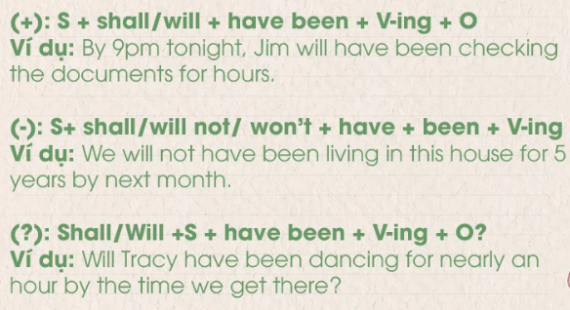
Cách dùng
Diễn tả một hành động/ sự việc đã xảy ra và kéo dài (nhấn mạnh sự tiếp diễn có tính liên tục) cho đến một thời điểm hay khi một hành động khác xảy ra trong tương lai.
2. Bài tập Thì tương lai hoàn thành tiếp diễn
Bài tập 1: Chia động từ ở trong ngoặc sang thì tương lai hoàn thành tiếp diễn
1. By the end of the week she ______ (work) here for 5 months.
2. By the end of this month they _______ (live) together for 7 years.
3. By midnight Jim _______ (play) this computer game for 48 hours.
4. By the time we get to Hanoi this evening, we _____ (drive) more than five hundred miles. We are going to be exhausted.
5. She __________ (study) Korean Culture for 4 years by the end of this year.
6. _____ they __________ (talk) for an hour by the time her boyfriend comes back?
Đáp án:
1. will have been working
2. will have been living
3. will have been playing
4. will have been driving
5. will have been studying
6. Will they have been talking
Bài tập 2: Chọn đáp án đúng trong mỗi câu sau:
1. Richel wants to speak with you. – Please tell her that I ______ her as soon as I have free time.
A. will call
B. will have called
C. will have been calling
2. Let’s meet at 5 pm tomorrow. – Sorry, I _____ at 5 o’clock.
A. will be working
B. will have worked
C. will have been working
3. Say goodbye to San now. By the time you return, she ______ for Vietnam.
A. will be leaving
B. will have left
C. will have been leaving
4. By 2023, he ______ as the director of this company for 20 years.
A. will work
B. will be working
C. will have been working
5. She promised that she ______ anyone about it.
A. won’t tell
B. wouldn’t tell
C. won’t have told
Đáp án:
1. A
2. A
3. B
4. C
5. B
Bài tập tổng hợp các thì trong Tiếng Anh
Exercise 1: Use the correct form of verbs in brackets.
1. In all the world, there (be) __________ only 14 mountains that (reach) __________above 8,000 meters.
2. He sometimes (come) __________ to see his parents.
3. When I (come) __________, she (leave) __________for Dalat ten minutes ago.
4. My grandfather never (fly) __________ in an airplane, and he has no intention of ever doing so.
5. We just (decide) __________ that we (undertake) ____________ the job.
6. He told me that he (take) __________ a trip to California the following week.
7. I knew that this road (be) __________ too narrow.
8. Right now I (attend) __________ class. Yesterday at this time I (attend) __________class.
9. Tomorrow I'm going to leave for home. When I (arrive) __________at the airport, Mary (wait) __________ for me.
10. Margaret was born in 1950. By last year, she (live) __________on this earth for 55 years .
11. The traffic was very heavy. By the time I (get) __________to Mary's party, everyone already (arrive) __________
12. I will graduate in June. I (see) __________ you in July. By the time I (see) __________ you , I (graduate) __________.
13. I (visit) __________ my uncle's home regularly when I (be) __________ a child.
14. That book (be) __________ on the table for weeks. You (not read) __________ it yet ?
15. David (wash) __________ his hands. He just (repair) __________ the TV set.
16. You (be) __________here before? Yes, I (spend) __________ my holidays here last year.
17. We never (meet) __________ him. We don't know what he (look) __________ like.
18. The car (be) __________ ready for him by the time he (come) __________tomorrow.
19. On arriving at home I (find) __________that she just (leave) __________a few minutes before.
20. When we (arrive) __________ in London tonight, it probably (rain) __________.
21. It (rain) __________ hard. We can't do anything until it (stop) __________
22. Last night we (watch) __________TV when the power (fail) __________.
23. That evening we (stay) __________up to talk about the town where he (live) __________for some years.
24. I (sit) __________down for a rest while the shoes (repair) __________.
25. Half way to the office Paul (turn) __________round and (go) __________back home because he (forget) __________to turn the gas off.
26. London (change) __________a lot since we first (come) __________ to live here.
27. While we (talk) __________on the phone the children (start) __________fighting and (break) __________a window
28. He used to talk to us for hours about all the interesting things he (do) __________ in his life.
29. You know she (stand) __________looking at that picture for the last twenty minutes.
30. I (spend) __________ a lot of time travelling since I (get) __________this new job.
31. When we (be) __________ at school we all (study) __________Latin.
32. When I (meet) __________ him , he (work) __________as a waiter for a year.
33. After he (finish) __________ breakfast he (sit) __________down to write some letters.
34. She (have) __________a hard life, but she's always smiling.
35. I think Jim (be) __________ out of town.
Đáp án
1. are - reach;
2. comes;
3. came - had left;
4. has never flown;
5. have just decided -would undertake;
6. would take;
7. was ;
8. am attending - was attending;
9. arrive -will be waiting
10. had lived;
11. got- had already arrived;
12. will see - see - will have graduated;
13. visited -was;
14. has been - haven’t you read;
15. is washing - has just repaired;
16. Have you been - spent;
17. have never met - looks;
18. will have been- comes;
19. found – had just left
20. arrive – will probably be raining;
21. is raining - stops;
22. were watching - failed ;
23. stayed – had lived;
24. sat – were being repaired;
25. turned – went – had forgotten;
26. has changed - came;
27. were talking – started - broke;
28. had done
29. has been standing;
30. have spent - got;
31. were - studied;
32. met – had been working;
33. had finished - sat;
34. has;
35. has been;
Exercise 2: Tìm lỗi sai và sửa lại các câu sau
1. They took my pencils, ripped my books and then laugh at me.
2. Susie goes out 4 hours ago and hasn’t come back, I’m worried.
3. Honey, have you seen my white shirt anywhere? Our daughter need it for a school project.
4. How did I met your mother? Well, we were both running late for work that day and then we was bumped into each other.
5. Stop! You being hurting yourself!
6. By the time I came, she is no where to be seen.
7. This song is so good that I have been listening to it since 4 hours.
Đáp án
1. laugh -> laughed
2. goes -> went
3. need -> needs
4. was bumped -> bumped
5. being hurting -> are hurting
6. is -> was
7. since -> for
Exercise 3: Choose the correct sentence among A, B, C or D which has the same meaning as the given one.
1. Eight years ago we started writing to each other.
A. We have rarely written to each other for eight years.
B. Eight years is a long time for us to write to each other.
C. We wrote to each other eight years ago.
D. We have been writing to each other for eight years.
2. The boy was so lazy that he couldn't stay up late to learn his lessons.
A. The boy was lazy enough not to stay up late to learn his lessons.
B. The boy was too lazy to stay up late to learn his lessons.
C. The boy was lazy enough but he stayed up late to learn his lessons.
D. The boy was lazy enough to stay up late to learn his lessons.
3. My father is tired of seeing any violent films.
A. My father hasn't seen a violent film.
B. My father has enjoyed all the violent films he has ever seen.
C. My father is worried about missing the next violent film.
D. My father never wants to see another violent film.
4. As soon as he waved his hand, she turned away.
A. He saw her turn away and he waved his hand.
B. No sooner had he waved his hand than she turned away.
C. She turned away because he waved his hand too early.
D. Although she turned away, he waved his hand.
5. John wishes he had remembered to send Mary a Christmas card.
A. John regrets not to send Mary a Christmas card.
B. John regrets forgetting not to send Mary a Christmas card.
C. John regrets not remembering sending Mary a Christmas card.
D. John regrets forgetting to send Mary a Christmas card.
6. My father hasn't smoked cigarettes for a month.
A. It's a month since my father last smoked cigarettes.
B. It's a month ago that my father smoked cigarettes.
C. It's a month that my father hasn't smoked cigarettes.
D. It's a cigarette that my father smoked a month ago.
7. Having finished their work, the workers expected to be paid.
A. The workers expected to be paid because they had finished their work.
B. Having their work finishing, the workers expected to be paid.
C. Having expected to be paid, the workers finished their work.
D. Having been finished their work, the workers expected to be paid.
8. Mr. Brown bought this car five years ago.
A. Mr. Brown started to buy this car for five years.
B. It has been five years when Mr. Brown has bought this car.
C. Mr. Brown has had this car for five years .
D. It is five years ago since Mr. Brown has bought this car.
9. John used to write home once a week when he was abroad.
A. John doesn't write home once a week any longer.
B. John enjoyed being written home every week when he was abroad.
C. John never forgot to write a weekly letter home when he was abroad.
D. When he was abroad he remembered to write home every week.
10. I haven't enjoyed myself so much for years.
A. It's years since I enjoyed myself so much.
B. It's years since I have enjoyed myself so much.
C. It was years since I had enjoyed myself so much.
D. It has been years since I have enjoyed myself so much.
Đáp án
1. D
2. B;
3. D;
4. B;
5. D
6.A;
7. A;
8. C;
9. A;
10. A.
Xem thêm các tài liệu Tiếng Anh hay, chi tiết khác:
- Thì hiện tại đơn (Present Simple) | Khái niệm, công thức, bài tập có đáp án
- Các thì quá khứ trong tiếng Anh | Quá khứ đơn, quá khứ tiếp diễn, quá khứ hoàn thành | Khái niệm, cấu trúc, cách dùng và bài tập vận dụng
- Các thì quá khứ trong tiếng Anh | Quá khứ đơn, quá khứ tiếp diễn, quá khứ hoàn thành | Khái niệm, cấu trúc, cách dùng và bài tập vận dụng
- Past perfect tense (Thì quá khứ hoàn thành) | Định nghĩa, công thức, cách dùng, dấu hiệu nhận biết và bài tập vận dụng
- Thì tương lai đơn (Future Simple Tense) | Định nghĩa, cấu trúc, cách dùng, nhận biết và bài tập vận dụng
TOP Việc làm "HOT" dành cho sinh viên:



















